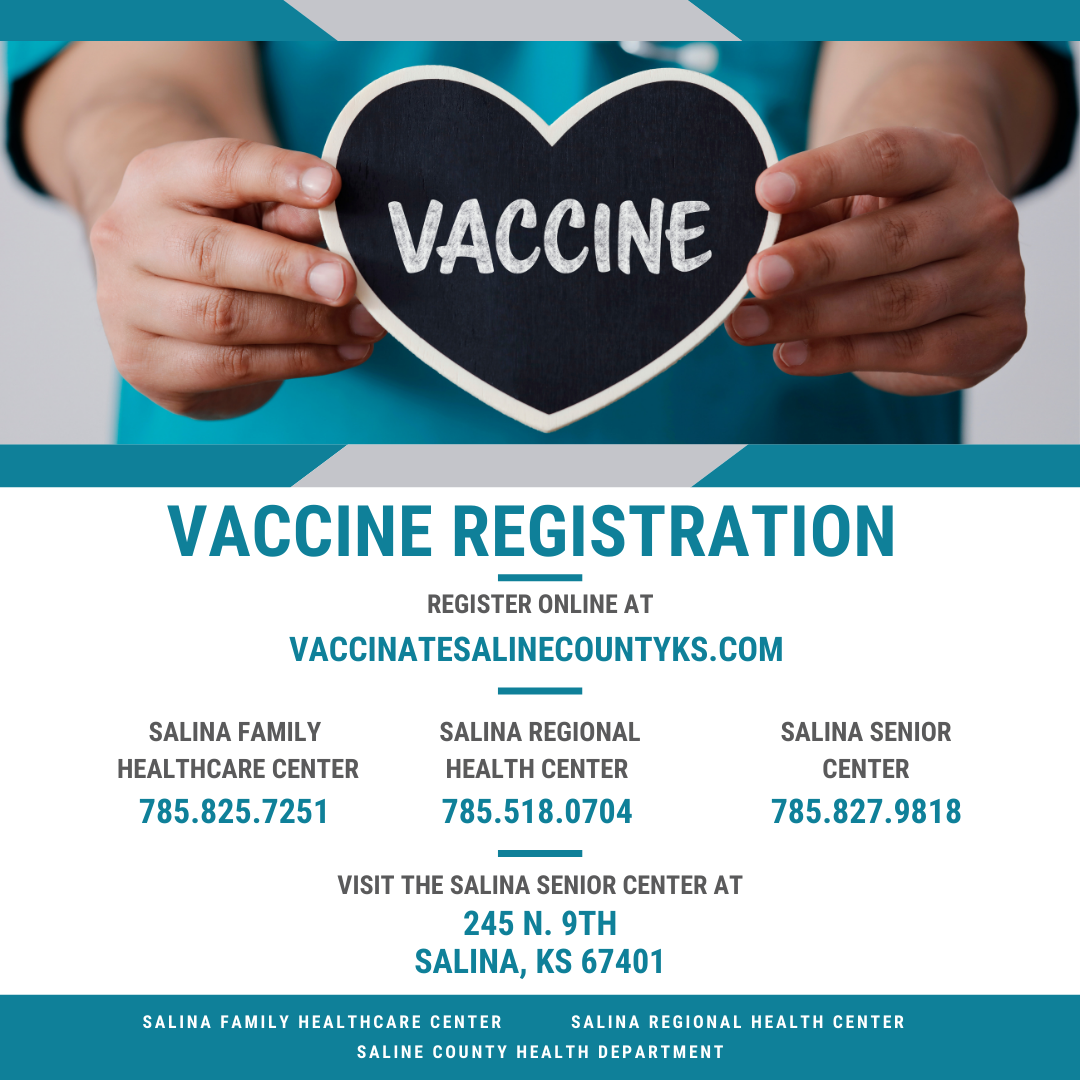Following is the Saline County Health Department Vax Facts update for Tuesday.
If you believe you are an eligible member of a Phase 2 population and have not yet registered please do so immediately.
If you have already registered, please do not register again.
The CDC has released new guidance regarding masking and social distancing after being fully vaccinated; however, Saline County and the City of Salina still has a mask requirement and public health order in place.
Currently just over 20 percent of the adult population who live and work in Saline County have received either one or both of their COVID-19 vaccinations. At least 70 percent will need to be fully vaccinated before the health officer recommends the mask requirement is lifted.
Masking is the most effective tool in preventing COVID-19 and other viruses, while being the least restrictive to personal freedom. Public health advises that mandates like a masking requirement should remain in place until at least 70 percent of the adult population are vaccinated to achieve some level of “herd immunity” and to allow individuals the opportunity to be self-determined in their own safety.
The currently public health order limiting mass gatherings and restricting business hours will remain in place until March 21. If numbers continue to trend downward, the public health officer intends to allow the order to expire. The mask requirement will remain in place until rescinded by the City and County Commissions.
The state of Kansas remains in Phase 2. The decision to move forward to Phase 3 will be decided at the state level.
The best vaccine for you is the first one offered to you. Dillon’s pharmacy is actively taking vaccination registrations and other pharmacies are anticipating being able to offer the same in the near future.
You are encouraged to sign up on as many lists as possible to get the vaccine as soon as possible.
If you receive a vaccine elsewhere please contact us to have your name removed from the registry. You will need to get both your first and second vaccine from the same organization.
Anyone living or working in licensed congregate settings and other special care or congregate environments.
●Licensed congregate settings are facilities licensed by the state or local government, that provide housing or care arrangements and where social distancing is not possible; they provide a form of social service or healthcare (or healthcare-associated) service.
●Settings included in this phase are monitored by the state or the local government, or house vulnerable populations under care, e.g. in-home care and retirement facilities.
●Risk is increased because of:
-Proximity, i.e., residents and staff are less than 6ft away from one another;
-Type of contact, i.e., exposure to droplets, shared surfaces, common items;
-Duration, i.e., average interactions last more than 10 min;
-Potentially high number of contacts and, sometimes, difficulties to implement protective measures.
●Examples include:
-Homeless shelters and other homeless housing settings and dwelling places;
-Congregate childcare institutions, adult and child protective services;
-Emergency shelters or safe houses for victims of domestic violence;
-Corrections facilities, including jails and juvenile justice facilities;
-Behavioral Health institutions (including mental health institutions) and residential treatment centers;
-Adult care homes, residents and staff in home plus facilities not covered in phase 1;
-Senior living homes;
-Home care givers (paid or unpaid), personal care aides.
High-contact critical workers
Workers providing critical services who are at a higher risk of being infected, because their jobs require consistent and close contact with a large number of individuals.
●Critical workers are those necessary to maintain systems, assets and activities that are vital to the state (or national) security, the economy, or public health, as defined by the Department of Homeland Security;
●Risk is associated with the likelihood of infecting oneself or spreading COVID. Factors that increase risk include proximity, type of contact, duration of contacts and challenges to implement protective measures;
●Settings that provide a critical service and have recorded high transmission rates or become clusters in the past are usually high risk.
●Examples include:
-Firefighters, police officers, first responders, correction officers;
-Grocery store workers and food services;
-K-12 and childcare workers, including teachers, custodians, drivers and other staff;
-Food processing, including meat processing plants;
-Large-scale aviation manufacturing plants;
-Transportation workers.
●Workers in the following industries, if they regularly need to be in high-risk settings to perform their duties:
-Retail, warehouses and sales outlets;
-Agriculture;
-Supply of critical services or materials for the COVID response (e.g. PPE);
-The U.S. Postal Service;
-Department of Motor Vehicles.
Senior citizens remain the priority Phase 2 population and continue to be allotted the majority of the unrestricted vaccine doses as we work to distribute vaccines throughout our community.
Vaccine supply remains the primary barrier to vaccinating our community.
Unfortunately due to the state allocation process local staff members are unable to tell you when you can expect a vaccine at the time of your registration. Please be patient and someone will call you as soon as we have vaccine available for you.
You can track KDHE's weekly vaccination allocation to each county on the KansasVaccine.gov data page.
Those without access to the internet can register via phone or by visiting the Salina Senior Services Center.
Please remember to be cordial with the medical personnel who are working tirelessly to serve the Saline County Community.






